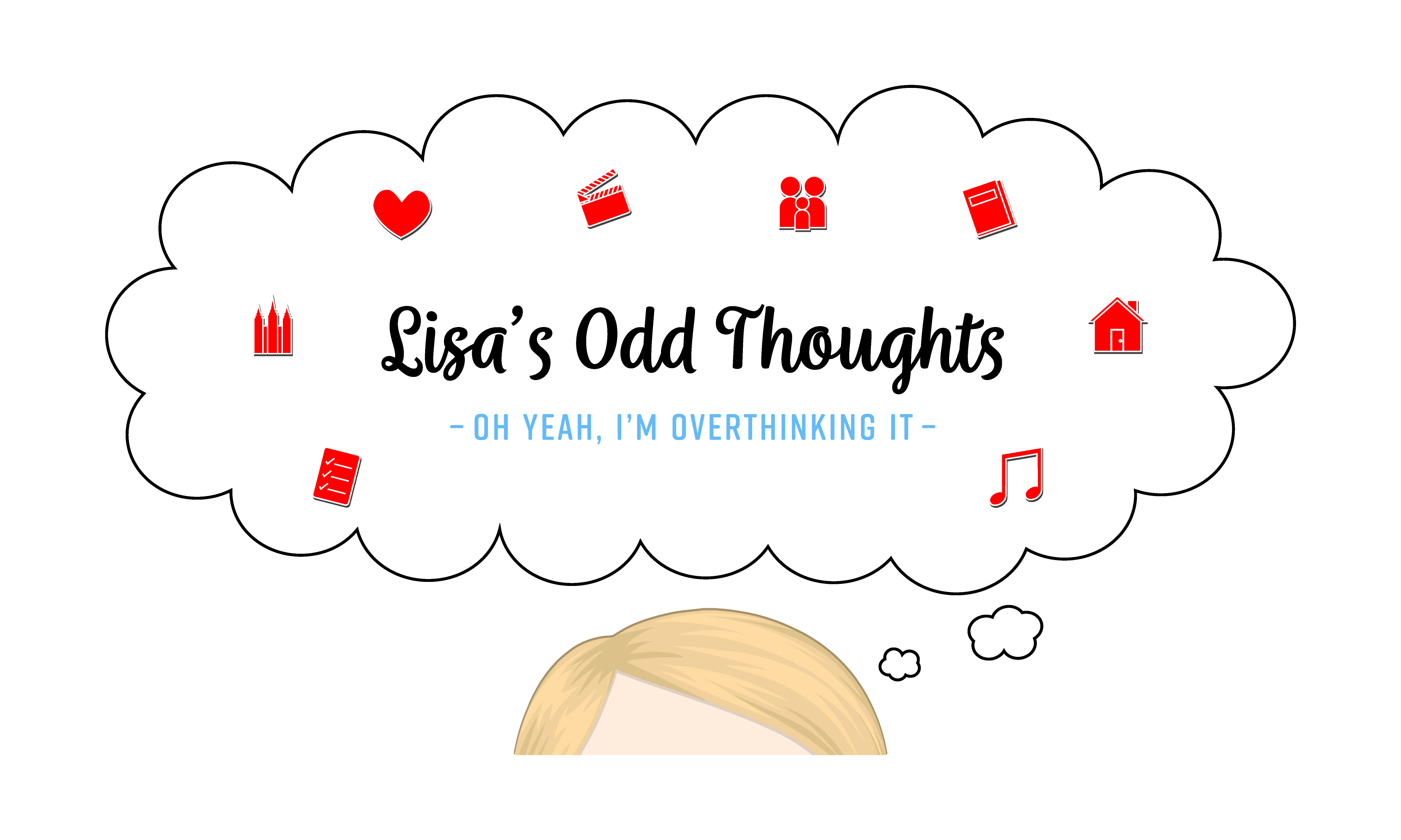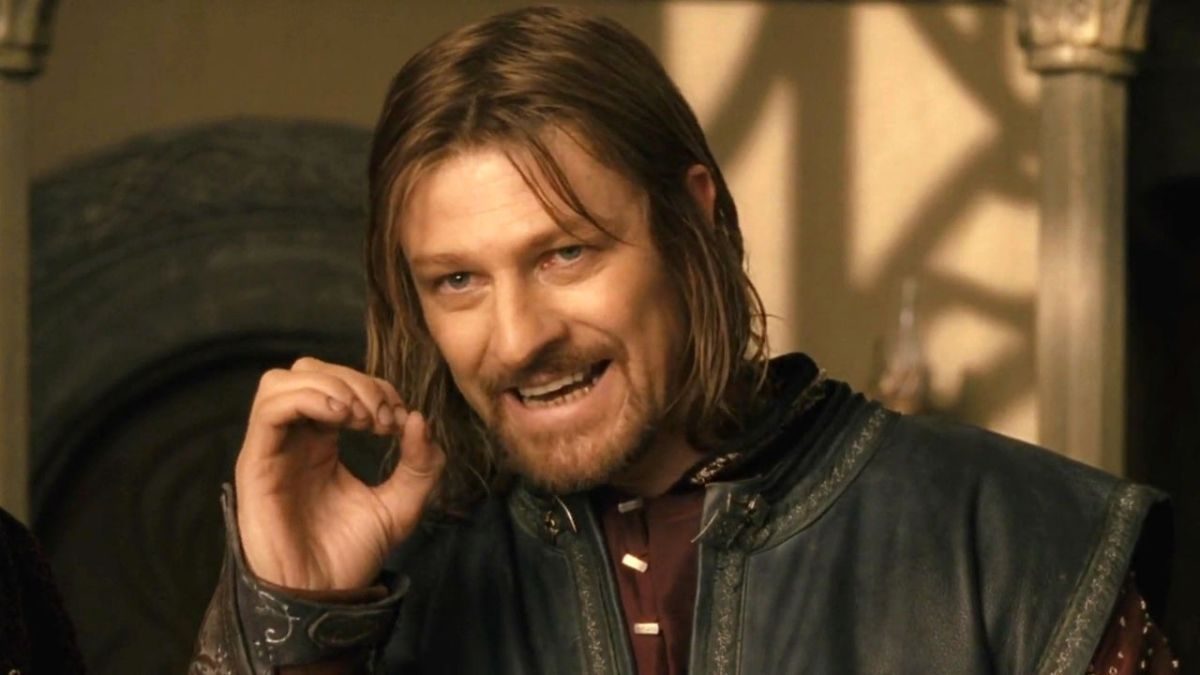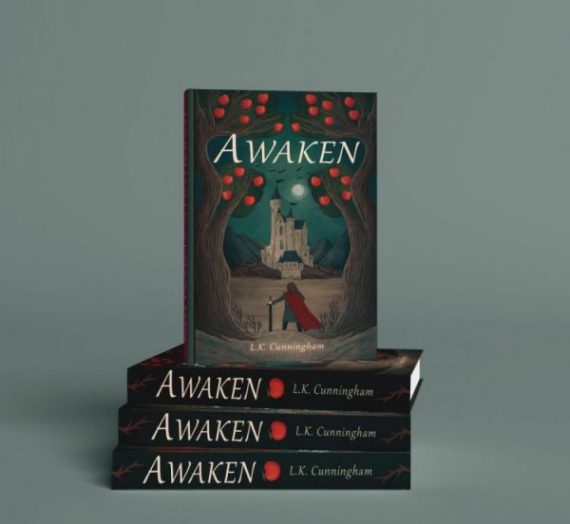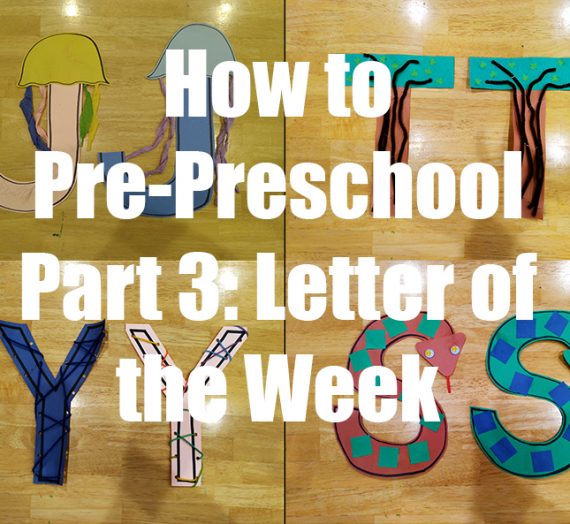Perhaps my most favorite movies of all time in the entire history of the cinematic world is The Lord of the Rings trilogy (happy 20th birthday to Fellowship of the Ring this year, by the way). My husband and I watch it together every year, usually during his Christmas break from work, and yes, it still hits me every single time.
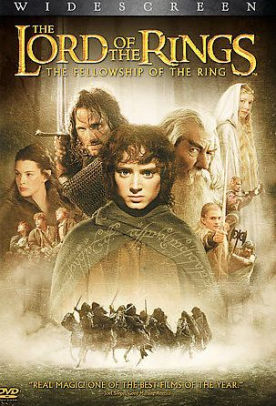
I could talk a LOT about all the things I love about The Lord of the Rings, but today I want to talk about one specific character: Boromir.
I remember way back when I first saw Fellowship, Boromir was just another bad guy. He’s corrupted by the Ring, attacks Frodo, and then dies. Boom. Bad guy gone…and the story continues.
But the more I watch these movies and study Boromir’s character, I actually find myself understanding him on a totally different level and relating to him unlike I had before. Now, twenty years later, I look forward to his character portrayal as one of the greatest and most meaningful highlights of Fellowship.
Let’s get into it.
Boromir is the first son of the steward of Gondor. He’s a captain there renowned for his skill and strength as a warrior, soldier, and leader.
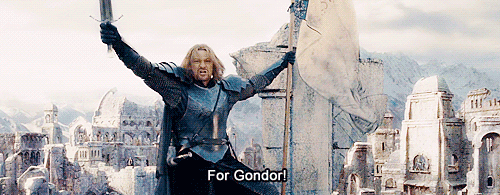
He arrives at Rivendell and attends the Council to discuss the One Ring, and infamously suggests that they use the One Ring as a weapon against Sauron. He gives a very stirring speech about how Gondor has defended the rest of Middle Earth against Sauron for years and years, and finally now they have a chance to defeat him once and for all…by using the One Ring for themselves.
But he is rejected, and rightly so. No one can wield the One Ring, and so everyone else agrees that it must be destroyed; someone must carry it into Mount Doom in Mordor and destroy the Ring. While Boromir disagrees with this decision, he obediently accepts it and joins the Fellowship of the Ring, swearing to protect and aid Frodo in his quest to destroy the Ring.
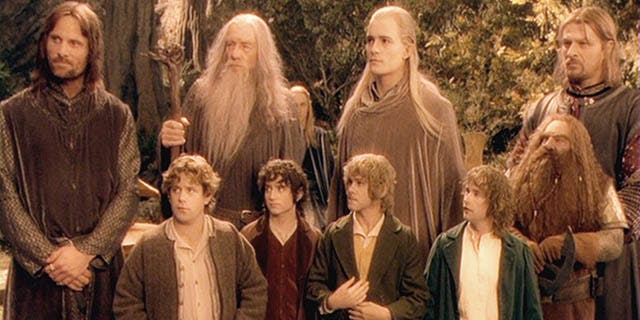
And so the journey begins. Boromir indeed proves himself a strong warrior and aids the Fellowship on their journey. But we see early on that the Ring is a great temptation for him and it’s pull over him grows and grows.

Ultimately, entering the climax of the movie, he approaches Frodo alone. Again, he tries to give a stirring speech about wanting to save his people and then asks Frodo for the Ring. When Frodo refuses, Boromir finally breaks and attacks him. Frodo only escapes by putting on the Ring to become invisible and then running away.
Only then does Boromir recognize what he’s become and the travesty of what’s he’s done. With visible tears in his eyes he tries to apologize, but Frodo is already long gone.
The climax builds with an attack by a band of Uruk-hai. They attack the Fellowship and an exciting battle takes place. Merry and Pippin, giving Frodo enough time to escape, act as a diversion and lead the Uruks away.
Then Boromir jumps in to help the two hobbits. He fights off many Uruks, but is ultimately shot with several arrows and he collapses and helplessly watches Merry and Pippin get carried away captive.
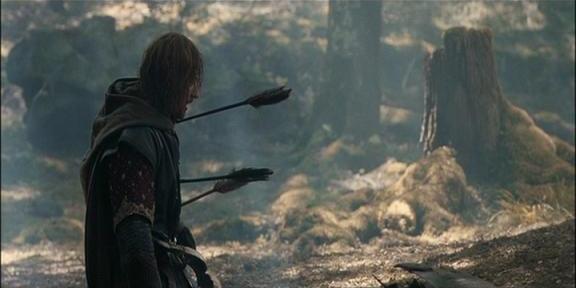
Aragorn arrives and kills the Uruk-hai about to deal Boromir the final death blow, but Boromir is still mortally wounded. He has just the strength to share one final conversation with Aragorn.
This conversation runs a little bit differently in the book than it did in the movie. In the movie Boromir confesses his sin to Aragorn and admits that he attacked Frodo, where in the book he doesn’t confess, although Aragorn guesses the truth. For the sake of this essay, I’m going to focus on the movie version of events and continue from there.
In the movie, Aragorn hears Boromir’s confession and his claim to failure.
“No,” Aragorn tells him. “You fought bravely. You have kept your honor.” In essence, Aragorn forgives Boromir for his crime against Frodo.
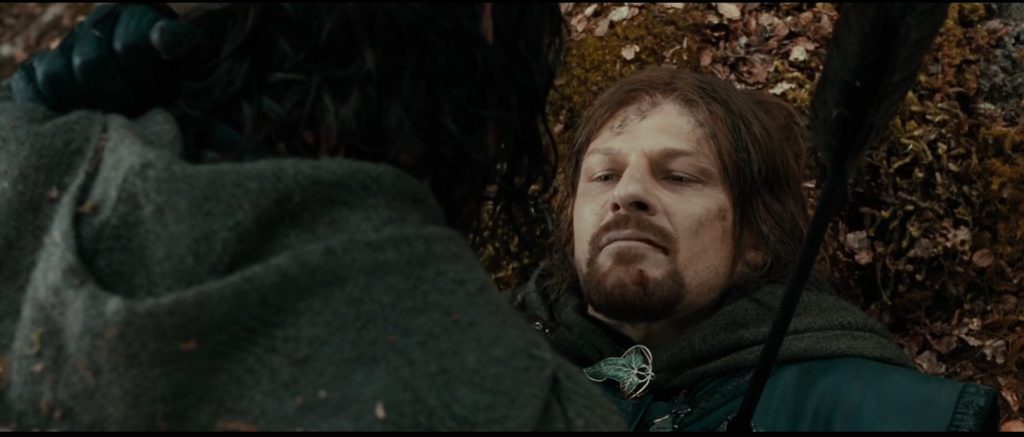
Then Aragorn promises to protect Gondor the best he can. With a final pledge of loyalty to Aragorn, Boromir succumbs to his wounds and dies. Aragorn, Legolas, and Gimli put his body in a boat and send him down the river before they follow the Uruk-hai in an attempt to rescue Merry and Pippin.
And thus ends the story of Boromir…but not the meaning of Boromir’s story.
The more I watched this movie, the more I realized this major fact: Boromir isn’t a bad guy. He can be labeled an antagonist in the sense that he is a barrier to the main character, Frodo, by attacking him, but that’s only for a brief moment near the end of the movie. For a bulk of his screen time, he’s actually a good guy, fighting with and aiding the rest of the protagonists.
But Boromir isn’t a bad guy in the sense that he’s not an immoral person. Gollum, Saruman, and Sauron are actual bad guys, as in they have immoral motivations and actively pursue evil. They are villains.
But Boromir isn’t like that.
Boromir is strong. He is humble and supportive in accepting the Council’s choice to destroy the Ring even though he disagrees with it. He is shown to be kind, passionate, and protective of those in his charge. He loves his country and his people and would sacrifice anything in their defense. In his brother Faramir’s flashbacks, Boromir is shown to be a respected leader and very loving toward his brother. These are all good qualities that Boromir embodies.
So why is he ultimately corrupted?
The answer is found in the extended edition of the movie (which I highly recommend for the entire trilogy, by the way).
While the Fellowship rests in the forest of Lothlorien, Frodo has a conversation with Lady Galadriel and she warns him that the Ring will corrupt every single member of the Fellowship. “It will take them, one by one,” she says.
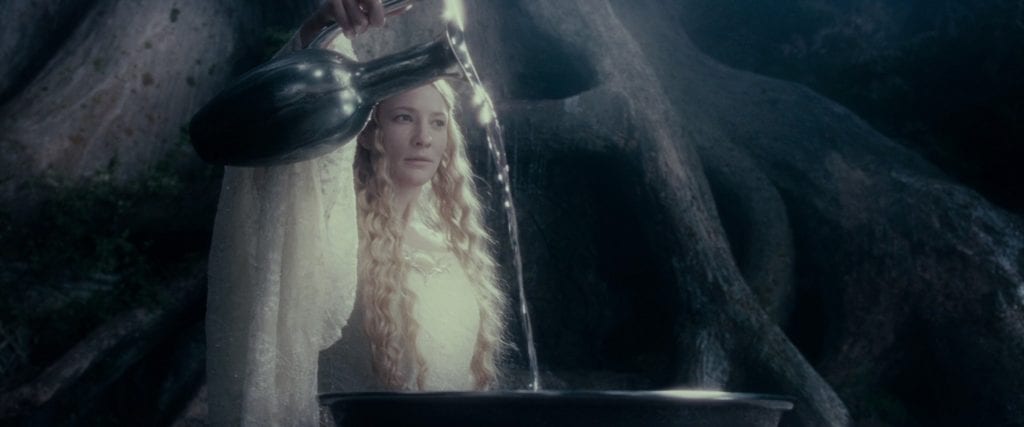
All of them, including Aragorn, Gimli, Legolas, Merry, and Pippin, would have eventually succumbed to the evil of the Ring and they all would have been corrupted…just like Boromir. This knowledge is the key reason that Frodo decides to abandon the Fellowship and continue the quest alone. He wants to protect both himself from their inevitable attacks and his own friends from the corrupting power of the Ring itself.
So Boromir is not alone in being corrupted, he’s simply the first to be so. There is nothing inherently wrong or evil within Boromir’s character that makes him the one and only corrupted member of the Fellowship. All would have eventually fallen.
Yes, we could emphasize a few reasons why Boromir was the first to fall. First and foremost I’d point to his initial disagreement with the Council; he had the strongest reason to doubt the purpose of their quest. Second, but closely linked to the first, was his desire to save his country of Gondor. He very genuinely (but incorrectly) believed that the Ring could be used as a weapon against Sauron. When he attacks Frodo, his first line where he loses control reads, “I only ask for the strength to protect my people!”
Regardless of the reason, remember that his corruption and fall were not unique. He was not a bad guy, but a perfectly normal guy.
This vital piece of knowledge means Boromir is perhaps the most relatable and important character to my own humanity. No one, not a single soul in the world, is incorruptible. Every single one of us is Boromir–despite our strengths and our best intentions, we are all susceptible to evil. We will all fall to darkness. We will all sin. We are all imperfect.
For fear of straying too far into that depressing abyss of endless and unavoidable sin, let me remind you this: Boromir is redeemed and forgiven.
Immediately after realizing that he has betrayed the Fellowship by attacking Frodo, we next see Boromir rise up in defense of his friends. He doesn’t wallow in his weakness, but stands up to fight, redeeming his character and reminding the audience that despite his flaws, Boromir is on the side of goodness and right.
He fights valiantly to protect Merry and Pippin, making his failure to save them all the more heart-wrenching. My favorite moment of that scene is when Boromir kneels on the ground, struck with arrows and utterly defeated, and can only watch as Merry and Pippin are carried away. And he is finally helpless to stop it.
Mmm. Right in the feels. In the saddest way possible.
I said earlier that he has a final conversation with Aragorn and confesses his sin only in the movie, but not the book. I like this movie version so much more because it is a direct representation of Christian repentance. Aragorn, in this scene, is a symbol of Jesus Christ, our Savior, and Boromir confesses his weakness to him. “I tried to take the Ring,” he says, struggling to breathe.
Now this scene is technically a “deathbed repentance,” in a very literal sense. But typically Christians use that term in a negative way, meaning that a person has waited until the very last moment to repent when they are on their deathbed. That negative implication is not the one I’m trying to make here.
Rather, I see a beautiful scene of a sinner begging for forgiveness from his symbolic Savior. Further, I see that symbolic Savior lovingly grant forgiveness, honor, and a promise of peace to a corrupt sinner.
So put yourself into Boromir’s symbolic shoes. It doesn’t matter that you are corrupted; we all are. Every single one of us is Boromir, fallen, sinful, and prone to evil.
But the good news is that through our Savior, none of that matters. The word “gospel” means “good news” and the good news of Jesus Christ’s Gospel is that you are forgiven and saved despite your weaknesses.
Yes, I identify with Boromir. I see myself in his character: I try to be strong, I try to do right, and I try to be on the side of good. But ultimately I will fail. I will always fail. I will always be corrupted by the One Ring.
Regardless, I will always be saved by my Savior Jesus Christ.
And that’s a beautiful thing.
